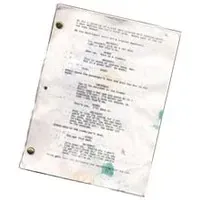Writer/producer relationship explored in July Writer's Room
Written by

The delicate and complex business of the writer/producer relationship went under the microscope at the July Writer's Room, hosted by Script to Screen. On the panel were producers Trevor Haysom (In My Father's Den, Crush, Possum) and Robin Scholes (Once Were Warriors, Broken English, Rain, Crooked Earth, The Tattooist), screenwriter Nick Ward (Stickmen, The Ferryman) and guest MC, producer and former NZFC Development Exec. Matt Horrocks.The delicate and complex business of the writer/producer relationship went under the microscope at the July Writer's Room, hosted by Script to Screen. On the panel were producers Trevor Haysom (In My Father's Den, Crush, Possum) and Robin Scholes (Once Were Warriors, Broken English, Rain, Crooked Earth, The Tattooist), screenwriter Nick Ward (Stickmen, The Ferryman) and guest MC, producer and former NZFC Development Exec. Matt Horrocks.The panel discussed the dynamics of the writer/producer relationship, which emerged as clearly a complex business, but one in which both sides were reliant on the other.
Mutual understanding essential for success
Such relationships are a key aspect of the industry because film is a medium that requires both creativity and practical planning, both visions and hard cash. For a writer/producer relationship to work well, both sides need to understand and respect the challenges involved in what each is trying to achieve.
Nick Ward expects three things from a producer: money, a good working relationship and respect. "You have to ensure you get on well together because your relationship might last a long time," he said, citing Whale Rider as a project that took ten years to complete.
Robin Scholes said both sides needed commitment. The producer takes a risk when committing herself to a writer's story because it is never certain that the end result will be successful. She advised writers to welcome the idea of partnership and to get beyond their anxiety that their ideas might be stolen or distorted.
Trevor Haysom talked about the importance and the nuances of a collaborative relationship: "I try to be as close as possible to the writer because working together gets the best out of both." If a relationship goes wrong - "if it becomes obvious that you want to make a different film to the writer or director" - then this suggests that the producer has not done his or her job well enough from the start.
Producers need clear idea to attract investment
Scholes stressed that producers had to do their homework to understand the market. "An idea must be clear to attract the right investors - one the writer thinks they can write and the producer believes they can sell". Filmmaking was unique because in most other business situations the product was already obvious. "Trying to sell a script involves people having to visualise the final product," she said.
Establishing a relationship
While established writers might prefer to write a complete script, a new writer should write a treatment first, making clear the particular strengths of the idea, then look for an appropriate producer.
An interested producer should be able to offer a simple deal to the writer, including how the rights were to be owned, what needed to be done within a specified time frame, how much the writer would be paid if the film went into production and what would revert back to the writer if the film did not go ahead. The New Zealand Writer's Guild can advise writers on these matters.
"The producer should be able to explain clearly and simply to the writer how they plan to make and finance a film," said Matt Horrocks.
Scholes described how a producer takes great care to choose the right people for the project, adding that finding an investor for a one-off drama was like throwing bait into a deep dark pool with very few fish: "You have to trawl and trawl until you find that one person in the world who wants to make the same film you and the writer want to make," she said. "They are a rare commodity, but if you find them they will fight along with you."
Genre films: easy to find investors, but need a twist
One of the most lively discussions of the evening focused on genre films. Scholes suggested that scripts with a clear genre were the easiest kind to find investors for, because they had an established audience. But it was essential that such scripts incorporated an original twist, so they could stand out from all the other genre scripts in the marketplace.
Haysom said that he was less interested in genre films, and as a producer he was looking for ideas that were more distinctive. A writer with an original idea should "rely on their gut instinct" and keep in touch with their initial impulse. This kept a writer on the right track, and made it most likely that a good producer would be drawn to their script.
Scholes also stressed the importance of scriptwriting by concluding that "In New Zealand we don't really have bankable directors or stars compared to Hollywood so the story has to be unique. It needs clever twists - and a deep emotional truth!"
"The massive turnout for our writer/producer night this month shows that writers are eager to gain a better understanding of how to work with producers," said Rebecca Kunin, Executive Director of Script to Screen.
"Script to Screen understands how crucial the writer/producer relationship is to the development process. We hope that advice from our experienced panel will help both writers and producers to build positive collaborative partnerships, as these creative partnerships are vital to the health of the screen industry as a whole."
Courtesy of Script to Screen
- Find out about Script to Screen's next event in Wellington on Thursday 16 August
12/8/07